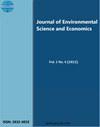The effect of financial development on economic Growth: Evidence from south Asian developing countries
引用次数: 13
Abstract
The debate on financial development and economic growth has been comprehensively growing for a long time in the theoretical and empirical literature but there is still conflicting views on this association. Several studies have been conducted on different regions and countries whether banks or stock market finance have any influence on economic growth but the results are still far from a significant conclusion. The empirical findings inclined the view that both banks and stock markets have positive impact on economic growth however some studies support the negative association which may varies on different sample of countries, methodology of the study, proxies for financial development and over time. Based on the ongoing debate, the current study examines the impact of both stock markets and bank based financial development on economic growth in four developing countries of south Asia for the period of 1980-2017. The study use static, dynamic and long run estimators to efficiently investigate this association. The outcomes specify that both market-based and bank-based financial development indices affect economic growth significantly and positively which indicates that the development of banking system and stock markets perform a very propounding role in strengthening economic growth in the sample countries. The long-run estimators also confirm the presence of long run association between variables. The robustness tests confirm the results of all models that both banks and stock markets development are important and contribute to economic growth in the same way in the sample countries and can’t be differentiated. The findings of this study have important policy suggestions to the sample countries government’s channels, regulatory and supervisory efforts on further improvement of both stock markets and bank-based development in order to attain higher economic growth.金融发展对经济增长的影响:来自南亚发展中国家的证据
长期以来,关于金融发展与经济增长的争论在理论和实证文献中全面展开,但对两者之间的关系仍有不同的看法。在不同的地区和国家进行了一些关于银行或股票市场融资对经济增长是否有影响的研究,但结果还远远没有一个显著的结论。实证研究结果倾向于认为银行和股票市场对经济增长都有积极影响,但一些研究支持负相关关系,这可能因国家样本、研究方法、金融发展代理和时间的不同而有所不同。基于正在进行的辩论,本研究考察了1980-2017年期间股票市场和银行金融发展对南亚四个发展中国家经济增长的影响。该研究使用静态、动态和长期运行估计器来有效地研究这种关联。结果表明,基于市场和基于银行的金融发展指数对经济增长都有显著的正向影响,这表明银行体系和股票市场的发展对样本国家的经济增长起着非常重要的作用。长期估计量也证实了变量之间存在长期关联。稳健性检验证实了所有模型的结果,即银行和股票市场的发展都是重要的,并且在样本国家以相同的方式对经济增长做出贡献,并且无法区分。本文的研究结果对样本国家政府进一步完善股票市场和银行发展的渠道和监管力度,以实现更高的经济增长具有重要的政策建议。
本文章由计算机程序翻译,如有差异,请以英文原文为准。
求助全文
约1分钟内获得全文
求助全文
来源期刊

Journal of Environmental Science and Economics
Environmental Economics-
自引率
0.00%
发文量
0
期刊介绍:
Journal of environmental science and economics (JESCAE), ISSN: 2832-6032 is an open access peer-reviewed journal that considers articles and reviews articles on all aspects of environmental economics.
Aim and Scope
Journal of Environmental Science and Economics is an international scholarly refereed research journal that aims to promote the theory and practice of environmental economics, Sustainability research, technological innovation, and economics. A broad outline of the journal''s scope includes; peer-reviewed original research articles, case, and technical reports, reviews and analyses papers, short communications and notes to the editor, in interdisciplinary information on the practice and status of research in environmental science, sustainability, technological innovations, and economics.
The main aspects of research areas include, but are not limited to; Environmental pollution control and abatement technology, Sustainable and economic Development, sustainable consumption and Sustainability, Environmental and sustainability assessment, transport and fate of pollutants in the environment, concentrations and dispersion of wastes in air, water, and non-point sources pollution, atmospheric pollutants and trace gases, environmental impact assessment, industrial ecology, ecological and human risk assessment; improved energy management and auditing efficiency and environmental standards and criteria.
 求助内容:
求助内容: 应助结果提醒方式:
应助结果提醒方式:


